Can My Dog Eat Bananas: A Complete Guide to Safe Feeding
Transparency matters to us! This post may include affiliate links, which means we earn a small commission if you make a purchase through our recommendations. This is at no additional cost to you. Read our full affiliate disclosure.
You’re enjoying your morning breakfast, slowly peeling a fresh banana when you notice those irresistible brown eyes staring up at you with pure hope. Your furry companion has perfected that look that melts hearts and opens treat jars, but this time, you pause and wonder: “Can my dog eat bananas safely?”
The good news is that bananas are not toxic and are safe for dogs to eat as a treat, and they actually offer genuine health benefits when given properly. However, like many human foods, bananas come with important considerations around portion size, preparation methods, and individual dog health needs that every pet parent should understand. Bananas are rich in potassium, vitamin B6, vitamin C, magnesium, biotin, and dietary fiber, making them a nutritious occasional treat that can supplement your dog’s regular diet. The key lies in understanding how to serve them safely while maintaining the balance that keeps your pup healthy and happy throughout their life.
Key Takeaways
- Bananas Are Safe in Moderation: Dogs can eat bananas as healthy treats when given in appropriate portions and frequency, following proper preparation guidelines
- Rich in Essential Nutrients: Bananas provide potassium, vitamin B6, vitamin C, fiber, and magnesium that support various aspects of canine health, including heart function and digestion
- Sugar Content Requires Caution: High natural sugar levels mean bananas should follow the 90/10 rule for treats in a dog’s daily caloric intake to prevent weight gain
- Preparation Matters: Remove peels completely and slice into appropriate sizes to prevent choking and digestive blockages
- Individual Dogs Vary: Dogs with diabetes, weight issues, or digestive sensitivities need special considerations or should avoid bananas entirely
- Treats Don’t Replace Nutrition: Bananas supplement but never substitute for balanced commercial dog food that provides complete nutrition
Nutritional Benefits of Bananas for Dogs
When given appropriately, bananas can provide genuine nutritional value that supports various aspects of your dog’s health and wellbeing. While your pup already receives complete nutrition from their balanced commercial dog food, the vitamins and minerals in bananas can offer supplemental benefits that many dogs enjoy. Understanding these nutritional components helps you make informed decisions about incorporating bananas into your dog’s treat rotation while maintaining their overall dietary balance.
Potassium for Heart and Muscle Health
Potassium in bananas supports healthy heart function, muscle contractions, and proper nerve signaling in dogs. This essential mineral plays a vital role in maintaining proper blood pressure and ensuring that your dog’s cardiovascular system functions optimally. For active dogs or those participating in regular exercise, the potassium content can help support muscle recovery and prevent cramping, though the amounts in treat-sized portions are relatively small compared to their regular food intake.
Vitamin B6 and Protein Metabolism
The vitamin B6 found in bananas contributes to protein production, brain function, and various metabolic processes that keep your dog healthy. This important vitamin helps with protein metabolism and supports proper brain function, which can be particularly beneficial for growing puppies or senior dogs whose nutritional needs may require extra support. While dogs typically receive adequate B6 from their regular diet, the additional amount from occasional banana treats can complement their existing nutrition.
Vitamin C and Immune Support
Although dogs naturally produce their own vitamin C, the vitamin C in bananas acts as an antioxidant and provides additional immune system support. This water-soluble vitamin helps protect cells from damage and may support your dog’s natural defense systems. The antioxidant properties can be particularly helpful for older dogs or those recovering from illness, though it should never replace proper veterinary care or prescribed treatments.
Fiber Content and Digestive Benefits
The dietary fiber in bananas can support healthy digestion when given in appropriate amounts. The fiber content may help with mild gastrointestinal issues, though it’s important to note that too much fiber can have the opposite effect and cause digestive upset. For dogs with regular, healthy digestion, small amounts of banana fiber can contribute to overall gut health and may help maintain regular bowel movements.
Magnesium for Bone and Muscle Development
Magnesium contributes to bone strength, muscle function, and various enzymatic processes throughout your dog’s body. The magnesium in bananas supports bone development and muscle function, which can be particularly beneficial for growing dogs or active adult dogs. This mineral also plays a role in energy production and helps maintain normal heart rhythm, contributing to your dog’s overall health when consumed as part of a balanced approach to nutrition.
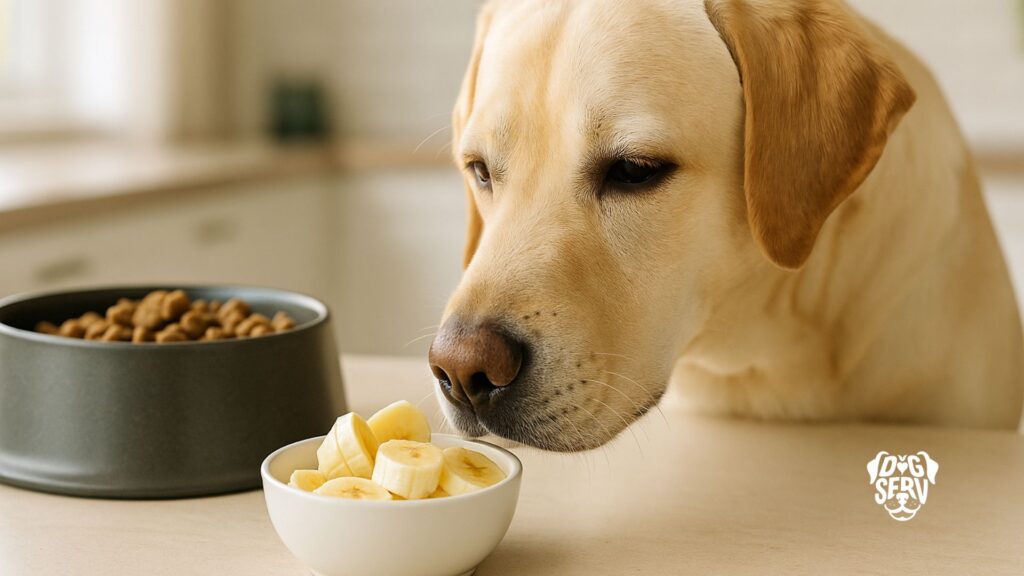
Safety Considerations and Potential Risks
While bananas are generally safe for dogs, several important precautions and potential problems require careful attention to ensure your pup stays healthy and happy. Understanding these risks helps you make informed decisions about when, how, and how much banana to offer your furry friend. Proper preparation and portion control are essential elements that determine whether bananas remain a beneficial treat or become a source of digestive problems or health complications.
High Sugar Content and Weight Management
The natural sugars in bananas can contribute to weight gain and obesity if fed in excessive amounts or too frequently throughout the week. Even though these are natural sugars rather than processed ones, they still add calories to your dog’s daily intake that can accumulate over time. Dogs who are already overweight or prone to weight gain should receive banana treats very sparingly, and you should always account for these extra calories when determining their regular meal portions.
Banana Peel Hazards
Banana peels are hard for dogs to digest and could cause a blockage or stomach upset, making complete removal essential before serving. While banana peels aren’t toxic, they present serious choking hazards and can create intestinal blockages that require emergency veterinary intervention. Always dispose of banana peels safely where curious dogs can’t access them, and double-check that you’ve removed all peel pieces before offering banana treats to your pet.
Digestive Sensitivity and Fiber Overload
Too much banana consumption can lead to diarrhea, constipation, or gastrointestinal upset due to the high fiber content that overwhelms your dog’s digestive system. Feeding too many bananas can cause gastrointestinal upset or constipation, particularly in dogs with sensitive stomachs or those not accustomed to high-fiber treats. Signs of fiber overload include loose stools, excessive gas, stomach discomfort, or changes in your dog’s normal bathroom habits that persist beyond a day.
Individual Health Conditions
Dogs with specific health conditions like obesity, diabetes, or digestive sensitivities should have limited access to bananas or avoid them entirely. Diabetic dogs face particular risks from bananas’ natural sugars, which can cause dangerous spikes in blood glucose levels. Dogs with pancreatitis, inflammatory bowel disease, or other gastrointestinal conditions may experience worsened symptoms from the fiber and sugar content, making veterinary consultation essential before introducing any new treats.
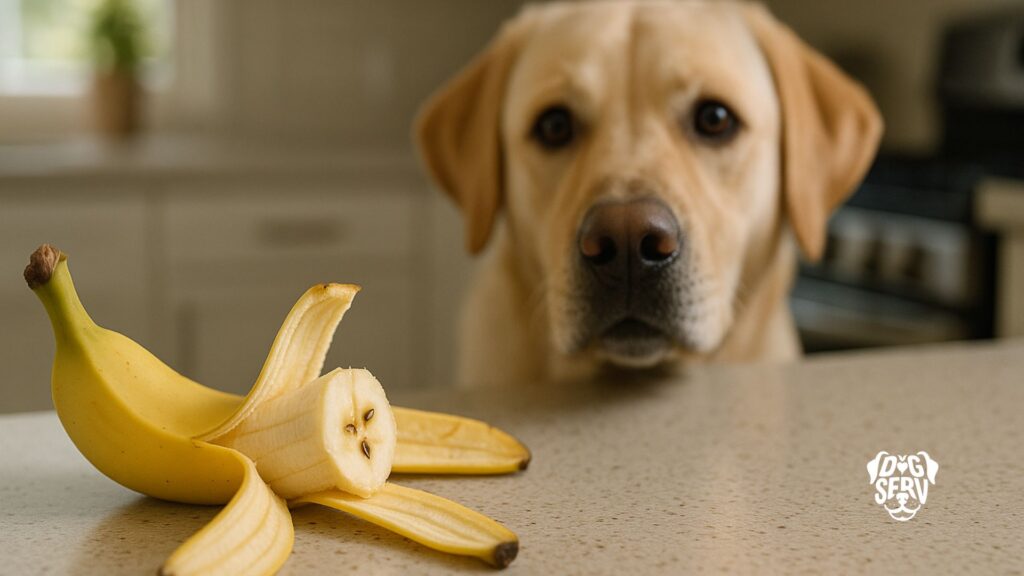
Proper Serving Methods and Preparation
Preparing bananas safely for your dog involves specific techniques that maximize enjoyment while minimizing health risks. The way you prepare and serve banana treats can make the difference between a positive experience and potential problems for your furry friend. Taking time to properly prepare bananas shows the same care and attention you give to selecting your dog’s regular food and treats.
Safe Cutting and Portioning Techniques
Start by completely removing the banana peel, ensuring no pieces remain attached to the fruit that could pose choking or digestive risks. Slice bananas into small pieces for easier digestion and portion control, adjusting the size based on your dog’s breed and chewing habits. For small dogs, cut banana pieces into tiny cubes no larger than your fingernail, while larger dogs can handle slightly bigger pieces about the size of a grape. Always supervise your dog while they eat banana treats to ensure they chew properly and don’t attempt to swallow large pieces whole.
Fresh vs. Prepared Serving Options
Fresh banana slices offer the simplest and most straightforward serving method, providing natural texture and flavor that most dogs find appealing. Bananas can be served fresh, mashed into dog food, or frozen for variety, giving you multiple options for incorporating them into your dog’s routine. Mashed bananas work well mixed into regular meals or used as a special topping, while frozen banana pieces provide cooling relief during hot weather and extended chewing time that many dogs find satisfying.
Combining with Dog-Safe Ingredients
Bananas can be mixed with dog-safe peanut butter or yogurt for enrichment, creating more complex and engaging treats that provide mental stimulation. When combining ingredients, always verify that peanut butter contains no xylitol, which is extremely toxic to dogs, and use plain, unsweetened yogurt without artificial additives. You can also blend small amounts of banana with cooked sweet potato or plain pumpkin to create nutrient-rich combinations that many dogs find irresistible.
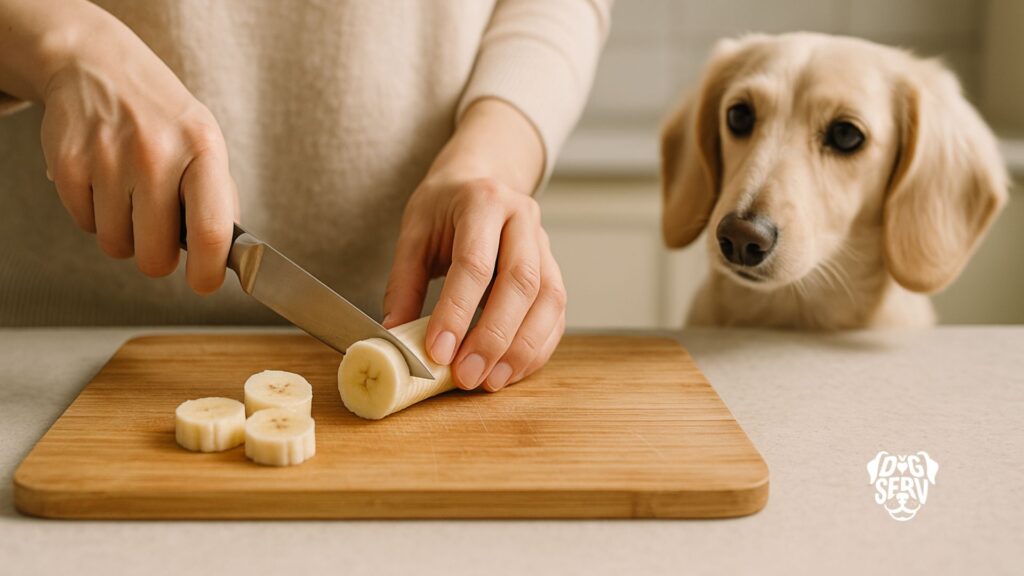
Portion Control Guidelines
Determining appropriate serving sizes and frequency requires careful consideration of your dog’s individual needs, size, and overall dietary requirements. Proper portion control ensures that banana treats remain a healthy addition to your dog’s routine rather than a source of excess calories or digestive problems. Following established guidelines helps you maintain the delicate balance between treating your pup and protecting their long-term health.
The 90/10 Rule Application
Follow the 90/10 rule where 90% of calories come from balanced dog food and 10% or less from treats, including bananas and all other snacks combined. This means you need to calculate your dog’s total daily caloric needs and ensure that banana treats, along with any training treats or other snacks, don’t exceed that 10% threshold. For most dogs, this translates to very small amounts of banana, typically just a few small slices depending on their size and activity level.
Serving Sizes by Dog Weight and Age
Small dogs under 20 pounds should receive no more than a few small banana slices per day, while medium dogs between 20-50 pounds can have slightly larger portions equivalent to about one-quarter of a banana. Large dogs over 50 pounds may be able to handle up to half a banana occasionally, but this should still be divided into smaller pieces and given throughout the day rather than all at once. Puppies require specialized diets for growth, so consult your veterinarian before introducing bananas or other non-standard foods to their routine.
Frequency and Timing Recommendations
Banana treats work best when offered 2-3 times per week at most, rather than daily, to prevent overconsumption of sugars and maintain nutritional balance. The best timing for banana treats is often between meals or as part of training sessions, where they can serve as high-value rewards for good behavior. Avoid giving bananas immediately before or after meals, as this can interfere with your dog’s appetite for their regular food or cause digestive discomfort from too much food at once.
Special Dietary Considerations
Certain dogs require modified approaches or complete avoidance of banana treats due to specific health conditions or life stages. Understanding these special circumstances helps you make safe decisions for dogs whose needs differ from the average healthy adult dog. Working with your veterinarian becomes particularly important when dealing with any of these situations.
Diabetic Dogs and Blood Sugar Management
Diabetic dogs should avoid bananas or have them only in very limited amounts due to high natural sugar content, which can cause dangerous spikes in blood glucose levels. The natural sugars in bananas can interfere with carefully managed diabetic diets and medication schedules that keep blood sugar levels stable. If you have a diabetic dog and want to offer occasional treats, work closely with your veterinarian to identify safer, low-sugar alternatives that won’t compromise their health management plan.
Weight Management and Obesity Prevention
Dogs who are overweight or on weight reduction diets need to avoid banana treats or have them only very occasionally in extremely small portions. The extra calories from bananas can significantly slow weight loss progress and make it harder to achieve healthy body weight goals. Instead of bananas, consider lower-calorie alternatives like small pieces of cucumber, green beans, or specially formulated weight management treats that provide satisfaction without excess calories.
Puppies and Growth Requirements
Young puppies have specific nutritional requirements focused on supporting rapid growth and development rather than supplemental treats. Puppies can have small amounts of banana occasionally, but consult your veterinarian first as their developing digestive systems may be more sensitive to new foods. Most veterinarians recommend waiting until puppies are well-established on their regular puppy food before introducing any treats, including bananas, to avoid disrupting their nutritional balance during this critical growth period.
Dogs with Digestive Disorders
Dogs diagnosed with inflammatory bowel disease, pancreatitis, food allergies, or other gastrointestinal conditions should avoid bananas unless specifically approved by their veterinarian. The fiber content and natural sugars in bananas can worsen symptoms in dogs with sensitive digestive systems or trigger flare-ups in those with chronic conditions. These dogs often require strictly controlled diets with limited ingredients, making banana treats inappropriate for their health management plans.
Creative Serving Ideas and Enrichment
Beyond simple treat-giving, bananas can become part of engaging activities that provide mental stimulation and variety for your dog. These creative approaches turn banana treats into enrichment opportunities that challenge your dog’s mind while providing the nutritional benefits they enjoy. Always maintain proper portion control even when using bananas in creative ways.
Frozen Banana Treats and Recipes
Freeze mashed bananas inside a fillable dog toy or blend with small amounts of water to create frozen treats perfect for hot weather relief. You can freeze banana slices on their own for simple frozen treats, or create banana ice cubes by blending banana with water and freezing in ice cube trays. For special occasions, try mixing small amounts of mashed banana with plain yogurt and freezing in silicone molds to create shaped treats that provide extended entertainment and cooling benefits.
Training and Enrichment Applications
Use tiny banana pieces as high-value training rewards during obedience sessions or when teaching new behaviors that require extra motivation. Bananas work particularly well for recall training since many dogs find them more exciting than standard treats, making them return to you more eagerly. You can also use banana pieces in puzzle feeders or scatter them in the yard for supervised sniffing games that provide mental stimulation while rewarding natural foraging behaviors.
Homemade Banana-Based Dog Treats
Create simple baked treats by mixing small amounts of mashed banana with oat flour and baking at low temperatures until firm. Always avoid adding sugar, chocolate, or other ingredients that could be harmful to dogs when making homemade treats. Simple recipes combining banana with ingredients like plain pumpkin, sweet potato, or oats can create special occasion treats, but remember that even homemade treats count toward your dog’s daily treat allowance and should follow the same portion guidelines.
What to Avoid: Unsafe Banana Products
While plain bananas are safe for dogs, many processed banana products and combinations pose serious health risks that every dog owner should understand. These dangerous items often contain ingredients that are toxic to dogs or provide excessive amounts of sugar and additives that can cause serious health problems. Being able to identify these unsafe products helps protect your dog from accidental poisoning or illness.
Banana-Flavored Commercial Products
Human foods like banana bread, muffins, chips, and other processed items containing banana flavoring are completely inappropriate for dogs due to added sugars, artificial ingredients, and potentially toxic components. These products often contain chocolate, xylitol, excessive amounts of sugar, or other ingredients that can cause serious illness or death in dogs. Banana chips sold for human consumption typically contain added sugars and preservatives that make them unsuitable for canine consumption, despite their banana content.
Dangerous Ingredient Combinations
Be particularly cautious of any banana products that might contain chocolate, which is toxic to dogs and can cause symptoms ranging from vomiting to seizures or death. Always check peanut butter labels to ensure it does not contain xylitol, an artificial sweetener that is extremely dangerous for dogs, even in small amounts. Nuts, raisins, macadamia nuts, or other common baking ingredients that often appear alongside bananas in human foods can cause serious health problems and should never be given to dogs.
Overripe and Moldy Bananas
Extremely ripe bananas contain higher concentrations of natural sugars that can cause digestive upset or blood sugar spikes in sensitive dogs. Moldy or spoiled bananas present serious health risks from harmful bacteria and fungi that can cause food poisoning or other serious illness in dogs. Always inspect bananas carefully before serving them to your dog, and discard any fruit that shows signs of mold, unusual odors, or excessive softness that indicates spoilage.
Signs of Overconsumption and When to Worry
Recognizing the symptoms of too much banana consumption helps you respond appropriately and seek veterinary care when necessary. Even safe foods can cause problems when given in excessive amounts, and knowing what to watch for protects your dog’s health and wellbeing. Early recognition of these signs often leads to better outcomes and faster recovery.
Digestive Upset Symptoms
Watch for diarrhea, vomiting, excessive gas, or changes in your dog’s normal bathroom habits that persist beyond 24 hours after banana consumption. Too much banana consumption can lead to gastrointestinal upset or constipation due to high fiber content, particularly in dogs not accustomed to high-fiber treats. Other signs include loss of appetite, stomach discomfort evidenced by hunched posture or reluctance to move, and unusual lethargy that differs from your dog’s normal energy levels.
Behavioral and Energy Changes
Some dogs may experience hyperactivity followed by energy crashes due to sugar spikes from excessive banana consumption. Watch for unusual restlessness, difficulty settling down, or conversely, unusual sluggishness that doesn’t match your dog’s typical behavior patterns. Changes in drinking habits, either excessive thirst or reduced water consumption, can also indicate digestive upset or blood sugar fluctuations related to too much banana intake.
When to Contact Your Veterinarian
Contact your veterinarian immediately if your dog shows signs of severe digestive upset, including repeated vomiting, bloody stools, or inability to keep water down after consuming bananas. Also seek professional help if your dog appears to be in pain, shows signs of dehydration, or exhibits any symptoms that worry you as a pet parent. For diabetic dogs or those with existing health conditions, even mild symptoms following banana consumption warrant veterinary consultation to prevent complications.

Alternative Healthy Fruit Options
Dogs who don’t tolerate bananas well or pet parents seeking variety in their dog’s treat rotation have several other safe fruit options to consider. Other dog-safe fruits provide similar nutritional benefits and can offer different textures and flavors that keep treat time interesting. These alternatives should also follow the same portion control guidelines and preparation methods as bananas to ensure safety.
Popular alternatives include apple slices with seeds and core removed, which provide fiber and vitamins with lower sugar content than bananas. Blueberries offer antioxidants in small, convenient sizes perfect for training treats, while watermelon provides hydration during hot weather with minimal calories. Always research any new fruit before offering it to your dog, as some fruits that seem harmless can actually be toxic to canines.
Veterinary Consultation Guidelines
Discussing banana treats with your veterinarian becomes particularly important for dogs with existing health conditions, special dietary needs, or a history of food sensitivities. Your vet can provide personalized guidance based on your dog’s specific health status, weight management goals, and any medications they may be taking. Regular check-ups provide excellent opportunities to discuss treat options and ensure that any additions to your dog’s diet support their overall health plan.
For diabetic dogs, dogs with pancreatitis, or those on prescription diets, veterinary approval before introducing any new treats is essential for maintaining their health management protocols. Your veterinarian can also help you calculate appropriate portion sizes based on your dog’s exact weight and caloric needs, ensuring that treats remain a healthy part of their routine rather than a source of nutritional imbalance.
Frequently Asked Questions About Can My Dog Eat Bananas
Q: Can dogs eat banana peels?
A: While not toxic, banana peels are difficult for dogs to digest and can cause blockages, so only feed the inner fruit after completely removing all peel pieces.
Q: How much banana can I give my dog daily?
A: Follow the 90/10 rule where banana treats should make up no more than 10% of your dog’s daily calories, typically 1-3 small slices for most dogs, depending on their size.
Q: Can diabetic dogs eat bananas?
A: Diabetic dogs should avoid bananas or have them only in very limited amounts due to high natural sugar content, and always consult your veterinarian first before offering any new treats.
Q: Are bananas good for dogs with upset stomachs?
A: Small amounts of banana may help with mild digestive issues due to fiber content, but they’re not a cure, and veterinary advice should be sought for persistent problems.
Q: Can puppies eat bananas?
A: Puppies can have small amounts of banana occasionally, but consult your veterinarian first as growing puppies have specific nutritional requirements focused on development.
Q: What’s the best way to serve bananas to my dog?
A: Remove the peel completely, slice into appropriate sizes for your dog’s breed, and serve fresh, frozen, or mashed in small portions as occasional treats.
Supporting Your Dog’s Health Throughout Their Life
Bananas can be a nutritious, safe treat for most dogs when given in moderation and prepared properly, but they represent just one small part of comprehensive canine care. Understanding proper portion control through the 90/10 rule, always removing peels completely, and considering your individual dog’s health conditions ensures that banana treats remain beneficial rather than problematic. Remember that dogs with diabetes, weight concerns, or digestive sensitivities may need to avoid bananas entirely or have them only under veterinary supervision.
At DogServ, we understand that making the best decisions for your furry family member involves having access to reliable, expert-backed information about every aspect of their care. From nutrition guidance to training support, health insights to product recommendations, our comprehensive platform connects dog lovers with the knowledge and resources they need to provide the best possible life for their companions. Whether you’re navigating treat options like bananas or seeking guidance on training, health care, or product selection, DogServ provides trusted advice from fellow dog enthusiasts who understand the deep bond you share with your pet.
Ready to give your dog the best life possible?
Join thousands of dog owners who trust DogServ for expert guidance on nutrition, training, and comprehensive care that supports your dog’s health and happiness at every stage of their life.
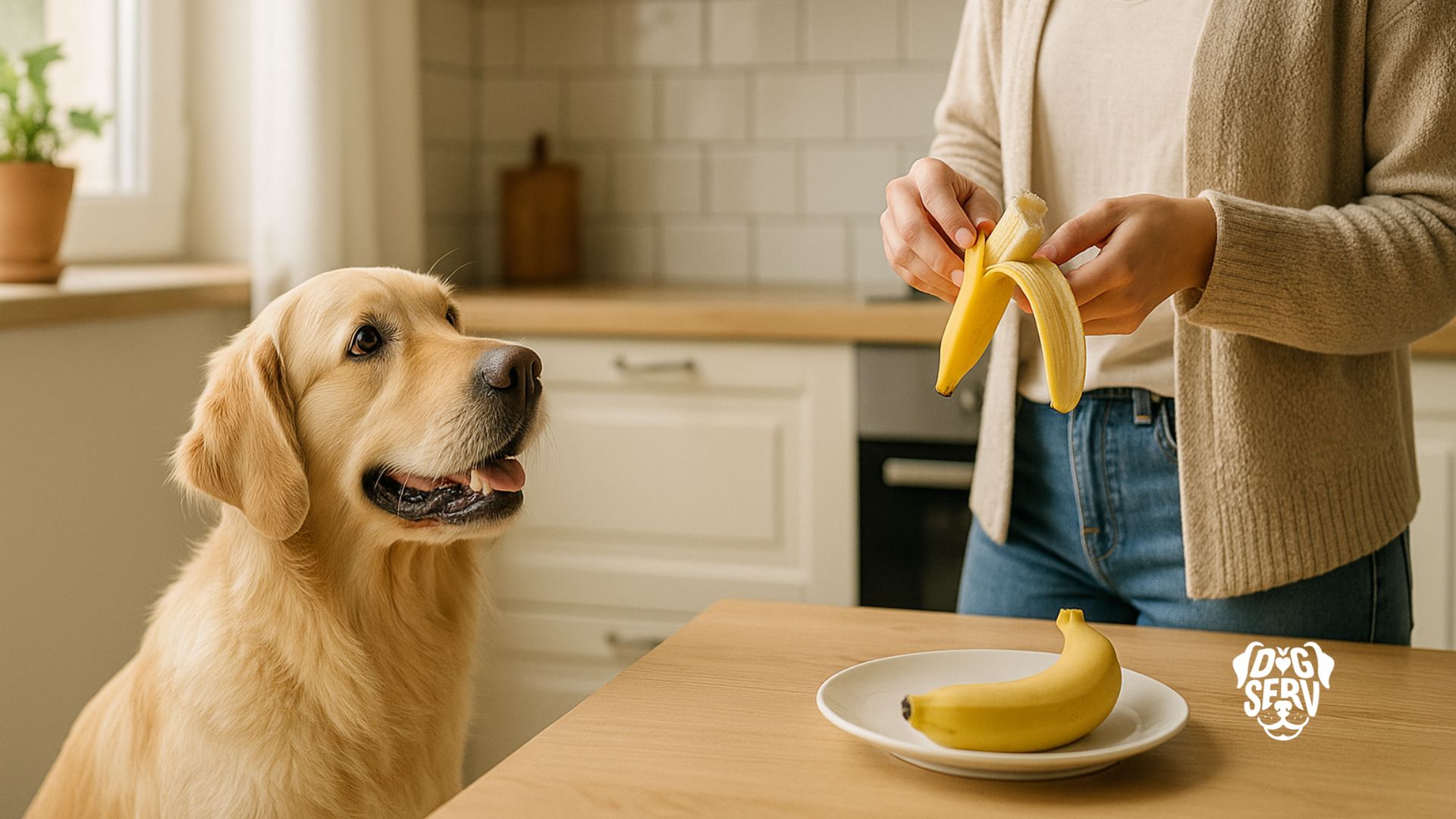


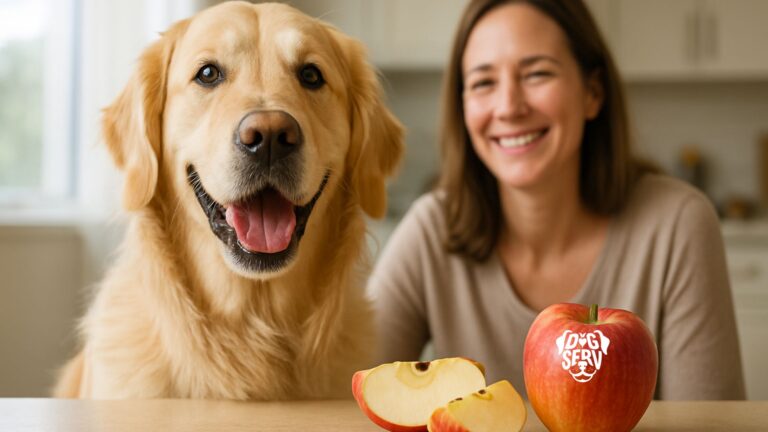
Calvin Hewitt is the primary author and driving force behind DogServ, bringing over 27 years of business expertise and 7 years of specialized digital marketing experience to the dog service industry. As the founder of Web Leveling and architect of DogServ’s evolution from a simple directory to a comprehensive one-stop shop for dog lovers, Calvin has created highly performing dog training websites in competitive markets, developed popular applications like “Can My Dog Eat?” and “Puppy Planning Checklist,” and generated thousands of monthly page views with his dog service content. Based in the Houston area but serving dog lovers and service providers nationally and internationally, Calvin works alongside a dedicated team of seven professionals, combining analytical rigor from his banking and energy industry background with a genuine passion for connecting dog owners, dog lovers, and service providers through quality content, innovative applications, and trusted recommendations.